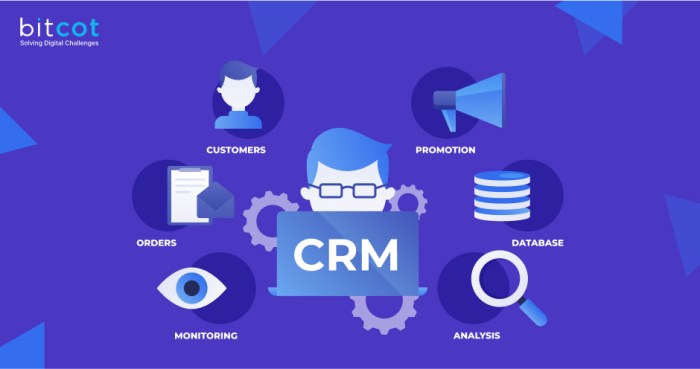Customizable CRM software is revolutionizing the way businesses manage customer relationships, offering tailored solutions that meet specific organizational needs. By allowing for personalization and adaptability, this software empowers companies to enhance their interactions with customers, ultimately driving satisfaction and loyalty.
In today’s competitive landscape, the significance of customizable CRM software cannot be overstated. With its core features designed to distinguish it from standard solutions, businesses across various industries can leverage these tools to gain a deeper understanding of their customers, optimize processes, and improve overall performance.
Definition and Overview of Customizable CRM Software
Customizable CRM software refers to customer relationship management solutions tailored to meet the unique needs of different businesses. This adaptability is crucial as it allows organizations to address specific challenges and optimize their processes. The significance of customizable CRM software lies in its ability to enhance customer engagement, streamline operations, and improve data management across diverse industries.
Customizable CRM solutions stand apart from standard CRM systems primarily due to their flexible features that can be tailored to align with a company’s operational workflows. Core features include modular functionality, customizable dashboards, and integration capabilities, enabling businesses to modify the software according to their requirements. Industries such as technology, healthcare, and retail benefit significantly from customizable CRM solutions, as they often face unique customer engagement challenges that require specialized tools.
Benefits of Using Customizable CRM Software
Customizable CRM software greatly enhances customer relationship management by allowing businesses to tailor interactions based on individual customer preferences. This personalization leads to improved customer satisfaction and loyalty. For businesses of various sizes, the advantages of such customization include increased efficiency, better data insights, and the ability to address specific market needs effectively.
Examples of customizable features include the ability to create personalized email campaigns, segment customers based on behavior, and generate tailored reports. These custom functionalities not only improve user adoption rates but also lead to higher satisfaction levels among employees, as they can utilize tools designed for their exact needs.
Key Features of Customizable CRM Software

Essential features to include in a customizable CRM system encompass data management, reporting tools, and workflow automation. These capabilities ensure that users can efficiently manage customer data and streamline processes.
| Must-Have Features | Optional Features |
|---|---|
| Contact Management | Social Media Integration |
| Lead Management | AI-Driven Insights |
| Reporting and Analytics | Custom Application Integration |
Successful implementations of specific features can be observed in various CRM systems, demonstrating how tailored functionalities contribute to enhanced user experiences.
Factors to Consider When Choosing Customizable CRM Software

When selecting a customizable CRM solution, businesses should analyze several critical factors. These include ease of use, the extent of customization available, and the quality of customer support provided by the vendor.
A checklist for evaluating potential CRM software options may include:
- Assessing user experience and interface design.
- Reviewing integration capabilities with existing tools.
- Evaluating customization options for different business functions.
- Considering scalability to accommodate future growth.
Scalability and integration capabilities play a vital role in ensuring that the CRM software can grow alongside the business and adapt to new technologies and processes.
Implementation Strategies for Customizable CRM Software
Implementing customizable CRM software within an organization involves a detailed, step-by-step process. The initial steps include gathering requirements, selecting the right vendor, and configuring the software to meet the specific needs of the business.
Best practices for training teams on using customizable CRM features effectively include:
- Conducting hands-on training sessions.
- Providing comprehensive documentation and resources.
- Encouraging feedback to improve training processes.
Common challenges during implementation may include resistance to change and technical issues. Strategies for overcoming these challenges include effective change management practices and ensuring robust technical support throughout the process.
Case Studies of Successful Customizable CRM Software Implementation

Several companies have successfully implemented customizable CRM software, demonstrating its impact on customer engagement and sales performance. For instance, Company A, in the retail sector, implemented a tailored CRM solution that led to a 30% increase in customer retention rates.
The table below summarizes key outcomes and metrics observed post-implementation for different companies:
| Company | Industry | Key Outcomes | Metrics |
|---|---|---|---|
| Company A | Retail | Increased customer retention | 30% increase |
| Company B | Technology | Improved sales conversions | 25% increase |
| Company C | Healthcare | Enhanced patient engagement | 40% increase |
Future Trends in Customizable CRM Software
Emerging trends in customizable CRM software include the rise of artificial intelligence and machine learning, which can enhance data analysis and customer insights. These advancements will likely lead to more personalized customer experiences and automated processes that streamline operations.
As technology advances, customer expectations are bound to evolve, prompting businesses to adopt CRM solutions that offer greater flexibility and customization. Predictions indicate a shift towards more intuitive user interfaces and deeper integration with other digital platforms to ensure seamless customer interactions.
Concluding Remarks: Customizable CRM Software
In summary, customizable CRM software offers a unique blend of flexibility and functionality that can lead to significant improvements in customer engagement and operational efficiency. As we look to the future, embracing these solutions will be crucial for businesses aiming to adapt to evolving customer expectations and technological advancements, ensuring sustained growth and success.
